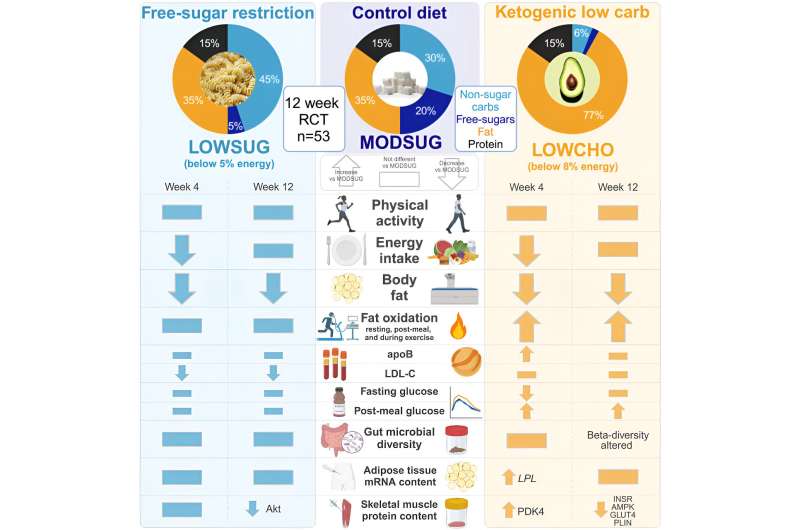August 6, 2024 report
This article has been reviewed according to Science X's editorial process and policies. Editors have highlighted the following attributes while ensuring the content's credibility:
fact-checked
peer-reviewed publication
trusted source
proofread
Keto diet study shows increased LDL cholesterol, higher apolipoprotein B and reduced gut bacteria

A team of health and nutrition specialists at the University of Bath, working with colleagues from the University of Bristol, the Oxford University Hospital Trusts, Maastricht University, and the Teagasc Food Research Center, has found that people on a ketogenic diet may experience an increase in LDL cholesterol levels, higher apolipoprotein B levels and reductions in certain gut bacteria.
In their study, published on the open-access site Cell Reports Medicine, volunteers went on a ketogenic diet for a month so the researchers could study its impact on their bodies.
A ketogenic diet consists of a drastic reduction in consumption of carbohydrates, replacing them with fats from meat, dairy, cheese, eggs and other foods such as avocados. Prior research has shown that those adhering to the rules do lose weight, but also that the diet may cause other health problems such as nutrition deficiencies, digestive problems, kidney stones and, over the long term, bone problems.
In this new effort, the research team suspected that the diet may also lead to increases in LDL cholesterol levels and possibly other problems. To find out if that might be the case, they conducted a randomized controlled trial by recruiting volunteers to go on the diet for a month and then to undergo a medical evaluation to determine changes.
The trial involved 53 non-obese adults. A third of them went on a ketogenic diet, another third went on a low-sugar diet and the remaining third ate what the researchers describe as a moderate diet to serve as a control.
After one month, all the volunteers were tested. The research team found that those volunteers on the ketogenic diet had lost on average 1.6 kg of fat. They also had 16% higher levels of LDL cholesterol in their blood than the control group and 26% higher levels of apolipoprotein B, a protein known to clog arteries. Those on the low-sugar diet lost on average of 1 kg of fat and had 10% lower levels of LDL cholesterol in their blood samples and no change in apolipoprotein B levels.
The researchers noted that those volunteers who had been on the ketogenic diet also had reduced levels of a type of gut bacteria known to be involved in promoting a strong immune system and also in the production of vitamin B.
More information: Aaron Hengist et al, Ketogenic diet but not free-sugar restriction alters glucose tolerance, lipid metabolism, peripheral tissue phenotype, and gut microbiome: RCT, Cell Reports Medicine (2024). DOI: 10.1016/j.xcrm.2024.101667
© 2024 Science X Network




















